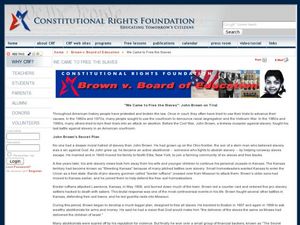Curated OER
Who Freed the Slaves During the Civil War?
Pose the question to your historians: who really freed the slaves? They critically assess various arguments, using primary sources as evidence. In small groups, scholars jigsaw 5 primary source documents (linked), and fill out an...
Library of Congress
Uncle Tom’s Cabin and the Fugitive Slave Act
From the time of its publication, Uncle Tom's Cabin has been controversial. To better understand the debate, class members first examine a broadside decrying the Fugitive Slave Act of 1850, and then two newspaper reviews of the novel...
Digital History
Representation: By State or by Population
Should representation in the new United States government be based on population? This learning exercise illustrates the details of this important quandary through an adaptation of speeches on the topic given at the Constitutional...
Curated OER
United States Quiz Two
In this United States worksheet, students answer short answer questions about which political party the Presidents belonged to and geography of the country. Students answer 20 short answer questions.
Curated OER
The Kansas-Nebraska Act of 1854: Popular Sovereignty and the Political Polarization over Slavery
Why did Stephen Douglas support the Kansas-Nebraska Act of 1854? Why did Abraham Lincoln oppose it? Young historians examine how the Kansas-Nebraska Act of 1854 affected the political balance between free and slave states and explore how...
Curated OER
African American Women Before and After the Civil War: Slavery and Freedom
Students listen to data on African American women in Texas before the Civil War. In this Civil War lesson, students compare and contrast the lives of slave and free women, and discuss case studies, locating areas on a map. Students...
Crafting Freedom
Man in the Middle: Thomas Day and the Free Black Experience
How did free and enslaved blacks work to craft freedom for themselves and their families before the Civil War? Young historians read about the life of Thomas Day, a free black man who also owned slaves and had abolitionist ties in...
Alabama Department of Archives and History
Alabama Slave Codes in 1833: What They Can Teach Us About Slaves Themselves
After viewing a short PowerPoint about Nat Turner's rebellion, class groups examine Alabama's 1833 slave codes. Individuals then develop a mini-legal brief arguing against one particular slave law.
Reading Through History
The Fugitive Slave Act of 1850
Why was the Fugitive Slave Act of 1850 so important? The reading in the resource discusses how the act affected Southerners, Northerners, and the slaves themselves. Scholars complete the reading as a form of direct instruction while...
Roy Rosenzweig Center for History and New Media
Reward: Valuable Slaves
To gain insight into the American institution of slavery and how African Americans were viewed during this time, groups examine run-away slave ads and slave auction broadsides. Teams use the provided worksheet to record their impressions...
Curated OER
The Antebellum South
Your history students will be on the edges of their seats during this fascinating presentation, which details the abolition movement and slave life during the Antebellum period in the American South. Students will be left agape at the...
Center for History Education
Did Southern Free Men of Color Fight for the Ideals of the South?
Much of history is distasteful. Primary sources often reveal attitudes acceptable at the time that no longer are. But to understand controversial historical events, historians must examine primary sources that represent a wide variety of...
Curated OER
After the American Revolution: Free African Americans in the North
Learners investigate the life of African Americans in the North during the American Revolution. They analyze how authors use various techniques to write biographies, read about Sojourner Truth, conduct research, and write an excerpt...
Curated OER
"We Came to Free the Slaves": John Brown on Trial
Learners explore the plight of John Brown to fight slavery. In this Brown vs. Board of Education lesson, students listen to a lecture regarding Brown's work to free slaves through rebellion. Learners participate in classroom discussion...
Curated OER
Am I Really Free?
Fourth graders write about slavery and freedom. In this freed slaves instructional activity, 4th graders read historical information about free blacks during slavery and explore books, objects and slave narratives to learn more. ...
Center for Instruction, Technology, & Innovation
Did African American Lives Improve After Slavery?
The Civil War made slavery illegal, but all ex-slaves were not totally free. Scholars visit eight different classroom stations to uncover life during the Reconstruction Era in America. Groups discover items such as Black Codes, 13th,...
Curated OER
Prince Hall and His Organization of Black Free Masons in the United States
Students examine the life of Prince Hall who became a member of the Free Masons during the time period of slavery. Depending on the grade level, they are shown pictures or read a reference guide listing the characteristics of each...
Curated OER
A Slave No More
Students discover what it was like to cross into freedom. In this slavery lesson, students read the "Emancipation Proclamation," and letters written by Abraham Lincoln and John Washington (a former slave). Students identify the key ideas...
Curated OER
Causes of the Civil War
Seventh graders identify and discuss the causes of the Civil War. They define the vocabulary terms-Civil War, economy, plantations, abolitionist, secede, and slave; read and discuss reading passages about the Civil War, and answer...
Curated OER
Simplified United States Constitution and Bill of Rights
A good handout is a great find. Print this resource and hand out a simplified version of the US Constitution and Bill of Rights to your US government or US history class. The powers of the president, Congress, and the Senate are...
Smithsonian Institution
Fighting For Freedom: The Stono Rebellion and Free Frank McWhorter
Travel back in time to the Stono Rebellion. Young historians research historical figures who played a role in African Americans' fight to escape slavery. Scholars research material, complete handouts, participate in group discussion, and...
Curated OER
Civil War
Historical poetry is lyrical in form and rich with content. After examining the differences between the Northern and Southern states before and during the U.S. Civil War, learners complete a Venn diagram and create an illustration of the...
Curated OER
Narrative of the Life of Frederick Douglass: An American Slave by Frederick Douglass
In this literature learning exercise, students respond to 12 short answer and essay questions about Narrative of the Life of Frederick Douglass: An American Slave. Students may also link to an online interactive quiz on the novel at the...
Tennessee State Museum
An Emancipation Proclamation Map Lesson
Did the Emancipation Proclamation free all slaves during the Civil War? Why was it written, and what were its immediate and long-term effects? After reading primary source materials, constructing political maps representing information...

























